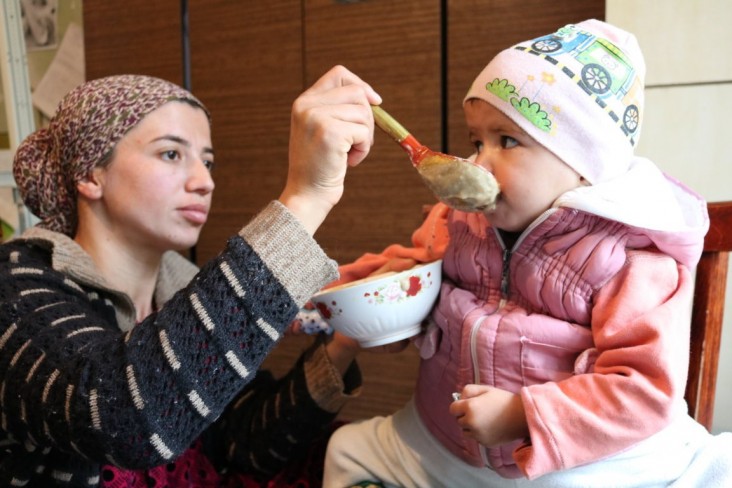Speeches Shim

Food insecurity, combined with the lack of knowledge about nutrition severely affects the lives of many families in Tajikistan, resulting in high levels of malnutrition especially among young children in rural areas. Faizina, a 29-year-old woman from Ayni district, previously worked as a seamstress, but when her two-year-old daughter, Omina began losing significant amounts of weight, she had no other choice than to stop working to take care of her daughter. Faizina recalls how her daughter’s health situation deteriorated: “Omina was so thin and exhausted that I could not believe that any medication would help her. She had no appetite and she would not gain weight.”
Faizina took her daughter to the local healthcare center. The medical staff informed her about the benefits of specialized nutritious food and enrolled Omina in a World Food Program (WFP) nutrition program. The WFP, in collaboration with USAID, implements the Prevention and Treatment of Moderate Acute Malnutrition activity, that provides malnourished children in five districts of Tajikistan with a therapeutic feeding program that includes Super Cereal Plus mix. The provision of Super Cereal Plus can rapidly improve nutrition outcomes. Over the next two months, Omina received weekly malnutrition treatment. She rapidly gained weight and was subsequently discharged from the program, having fully recovered.
During the visits to the healthcare center, Faizina learned about nutrition and hygiene. The medical staff taught her how vitamins and micronutrients affect the growth of children and which foods she should prepare to keep her family healthy. In addition, she also learned about proper hygiene and sanitation, and how proper hygiene can improve the health of her family.
“I grew up in a village where people did not pay much attention to hygiene and we often experienced food shortages resulting in an unbalanced diet,” Faizina notes. Her father worked in the district’s communal service department in Ayni, receiving a salary that barely fed his family of six. At the age of 15, Faizina was forced to leave school to earn money. Faizina always loved sewing, so she enrolled in a sewing course and began taking orders from relatives and neighbors until her daughter was diagnosed with moderate acute malnutrition.
Faizina was relieved when her daughter gained weight during the malnutrition treatment. To help others, she started teaching other mothers how to prepare Super Cereal Plus for their children. She also engaged community members to inform them about the importance of nutritious food for young children. Ashurbibi, a local medical provider, reported that: “Thanks to Faizina’s support, the number of clinical visits has increased in the community.”
For her family, Faizina now tries to cook two nutritious meals a day with fresh ingredients, and “not just something to eat.” Her husband, Bahodur, also noticed the positive impact of the nutritious food on the health of their family. He used to migrate to Russia for work, however due to a health condition, he is no longer able to travel for work. Bahodur follows his wife’s nutritional recommendations and frequently buys fresh vegetables and dairy products. Soon, Faizina plans to take up sewing again. The young mother hopes that one day her daughter will go to university, and get a good job so she can enjoy life without having to worry about her next meal.
Along with the treatment of moderate acutely malnourished children between 6-59 months, the WFP with USAID support is training medical staff and strengthening primary healthcare centers’ capacity to improve the supply chain management of supplementary foods and to expand the electronic registration of patients’ treatment process. The WFP is helping the Ministry of Health and Social Protection conduct campaigns to influence the nutritional habits and behavior of the population to prevent malnutrition in Tajikistan. The USAID-funded Prevention and Treatment of Moderate Acute Malnutrition activity runs from 2017 to 2021.

Comment
Make a general inquiry or suggest an improvement.